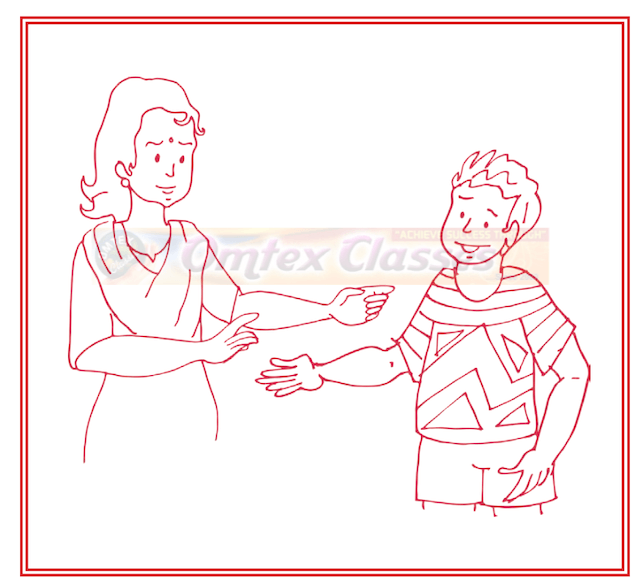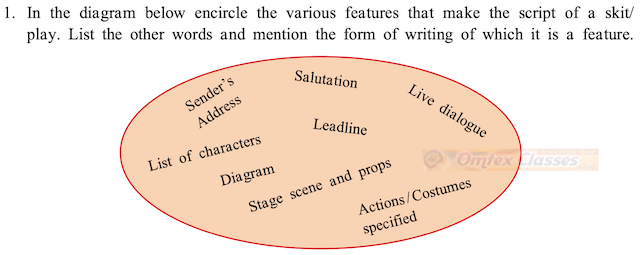Chapter 3: The Past in the Present
We find the following in the script of a skit or play. Rearrange these steps in the proper order and write them down in the form of a flow chart.
SOLUTION
Think of a play/skit which you have seen enacted on the stage and which has impressed you. Write the following details about it.
SOLUTION
Present these points in the form of a review, and give it a suitable title.
SOLUTION
Rise and fall: Macbeth's Ambition
Macbeth is a tragic drama written by the great Shakespeare that still appeals to people after 500 years. It is inspired by real historical events in Scotland during the 9th Century. The main characters are Lord and Lady Macbeth, the three witches, Lord Macduff, Lord Banquo, King Duncan, and his son Malcolm. One of the best stage adaptations of this play had Ian McKellen and Judi Dench playing the roles of Lord and Lady Macbeth. It felt less like a drama and more like the story was taking place in front of us. All the actors seemed to be the people they were playing. The detailed costumes, elaborate sets, and immersive sound and visual effects added to their theatrical skills. The castles of Forres, Inverness, and Dunsinane Hill, as well as Bimam Wood, all felt like live locations. The theme of merciless ambition leading to one's eventual fall is something that we can all relate to. The play reaches its peak in the final battle where Macbeth meets his end at the hands of Macduff. The end is happy as the rightful heir to the throne Malcolm promises his people to be a good king.

Prepare a ‘PowerPoint’ presentation, using one slide for each of the above points. Present your review in a PPT format in the classroom.
SOLUTION
Do it Yourself.
The diagram below encircles the various features that make the script of a skit/ play. List the other words and mention the form of writing of which it is a feature.
SOLUTION
Lead.line is a feature of a News Report. Salutation and Sender's Address are features of a Letter. The diagram is a feature of Information Transfer.

Choose the proper alternative to complete the following.
The skit covers a period of about ________ in the past.
OPTIONS
3000 years
1000 years
5000 years
1800 years
__________ characters from Neel’s ancestral lineage make an appearance in the play.
OPTIONS
Fourteen
Seven
Sixteen
Twelve
The task that all boys abhorred was ____________.
OPTIONS
cleaning up their room
farm-work
filling up water
making their beds
The skit conveys that doing your daily chores at home __________________.
OPTIONS
makes you stronger
sharpens your intellect
saves a lot of expenses
inculcates a sense of responsibility

Fill in the table.
SOLUTION

Answer in your own words.
What excuses did Neel give to avoid cleaning his room?
SOLUTION
To avoid his chores, Neel gives the excuse that he had just cleaned his room two days before. He also says that his bed will get messed up when he rests after lunch, so why should he make it.
Why does a mother tell Neel about his Grandpa?
SOLUTION
Neel's mother tells him about his Grandpa to show him that his Grandpa had many more difficult tasks to do, both inside and outside the house. She wants him to know that his life is easier.
What task did Grandpa wish to avoid?
SOLUTION
Neel's Grandpa, like him, wished to avoid making his bed after all the chores that he had done.
What did the ancestor from 1910 wish to do instead of making his bed?
SOLUTION
The ancestor from 1910, Neel's great-great-grandfather, wished to go to the riverside to play with his friends instead of making his bed.
How many chores did the ancestor from 1800 have to do?
SOLUTION
The ancestor from 1800 had to wash clothes at the river and put them up to dry, chop the wood, fix the broken fence, and take the goats to graze.
How is the boy from the 1500s dressed?
SOLUTION
The boy from the 1500s is dressed in a sleeveless loose V-neck top and a dhoti.
What chores did the boys from 1000 CE and 1st Century CE, do on their farms/fields?
SOLUTION
The boy from 1000 CE had to fetch water from the lake, pour it into the farm channels to water their crops, dear the blocked channels, and pull out weeds. The boy from 1st Century CE had to feed the poultry, tend the sheep and keep the birds away in the field using a sling.
What did Neel realise from his encounter with his ancestors?
SOLUTION
After meeting his ancestors, Neel realised that his ancestors had a life with more hard work and that his life was much easier compared to theirs. They would have to do household work and help their family with other tasks instead of just their daily chores.

In the play, two devices that make use of wheels are given. The devices are:
_______________
_______________
From the internet or other sources, trace the history of the use of the wheel. Write ‘An Autobiography of a Wheel’.
SOLUTION
The devices are (1) Bicycle (2) Grinding stones You all know me as your helpful friend, I'm the wheel. I was born in prehistoric times when humans saw a log of wood roll down a hill. They realised that a round object can spin and move objects with it. Such logs were used to transport blocks of stone as a primitive conveyor belt. They slowly shaped and developed me in a similar shape to what you now know. I was joined to my friend, the axle and rest, as they say, is history. I was used for many things; children would play with me as toys, men would use me to make pots and women would grind grain using me. I was also attached to pieces of wood to form a cart that would take people anywhere they wanted. It could be used to carry food and other goods and was pulled by animals like horses, oxen, camels. Later, I was used by people to steer, these vehicles in a new form called a steering wheel. Slowly, I was used in mills to draw water, and in factories to produce the goods which I transported. I was made better till I was everywhere. I controlled not only cars but also ships and even planes much later. These planes flew using propellers and jet engines which are other versions of me. I also realised that I'm a simple machine that can be used to make complex machines. I run inside all mechanical objects from watches to computers and am used mainly to power them. I even create electricity which is created from a spinning version of me called the turbine which is connected to a generator to create energy. I am busy working everywhere for your benefits, but I don't want anything in return. I just wanted to tell you my story, my friends, and J thank you for listening

Imagine that the ancestor from 1910 (AD) visits Neel in his dream. Compose a dialogue between the two about the various gadgets the visitor sees in Neel’s room.
SOLUTION
(Neel is sleeping peacefully and his ancestor Mahesh from 1910 visits him in his dream)
Imagine and compare an argumentative dialogue between the mothers of the 20th/21st century and those of the earlier era, about which life was better for women.
SOLUTION


Read the entry about ‘voice’ in the ‘Language Study’ pages. Note that the speeches of all the boys are in the ‘active’ voice. Turn them into passive constructions.
Neel - I put the dishes in the dishwasher.
SOLUTION
Passive - Dishes have been put in the dishwasher.
1950s Boy - I have watered the garden.
SOLUTION
Passive - The garden has been watered by me.
1950s Boy - brought home the groceries.
SOLUTION
Passive - The groceries have been brought home by me.
1950s Boy - dusted the living room.
SOLUTION
Passive - The living room has been dusted by me.
1950s Boy - cleaned my bicycle.
SOLUTION
Passive - My bicycle has been cleaned by me.

Think of suitable names for the boys from the earlier centuries.
SOLUTION
1950s Ashok
1910 Pratap
1800s Madhav
1500s Malhar
1000 Ramanath
100 CE Krishnadeva
3000 BCE Uruk

Form groups of 5-8. Translate the play into your mother tongue (or Hindi) as a group activity. Enact the translation in the classroom.
SOLUTION
Do it yourself.

Read ‘The Story of the Amulet’ by E. Nesbit.
SOLUTION
Do it Yourself.
Balbharati Solutions for English Kumarbharati 9th Standard Maharashtra State Board
• Chapter 1.2: A Synopsis-The Swiss Family Robinson
• Chapter 1.3: Have you ever seen...?
• Chapter 1.4: Have you thought of the verb ‘have’
• Chapter 2.2: A True Story of Sea Turtles
• Chapter 2.3: Somebody’s Mother
• Chapter 2.4: The Fall of Troy
• Chapter 2.6: The Past in the Present
• Chapter 3.2: Reading Works of Art
• Chapter 3.3: The Road Not Taken
• Chapter 3.4: How the First Letter was Written
• Chapter 4.2: The Storyteller
• Chapter 4.3: Intellectual Rubbish
• Chapter 4.4: My Financial Career
.





















